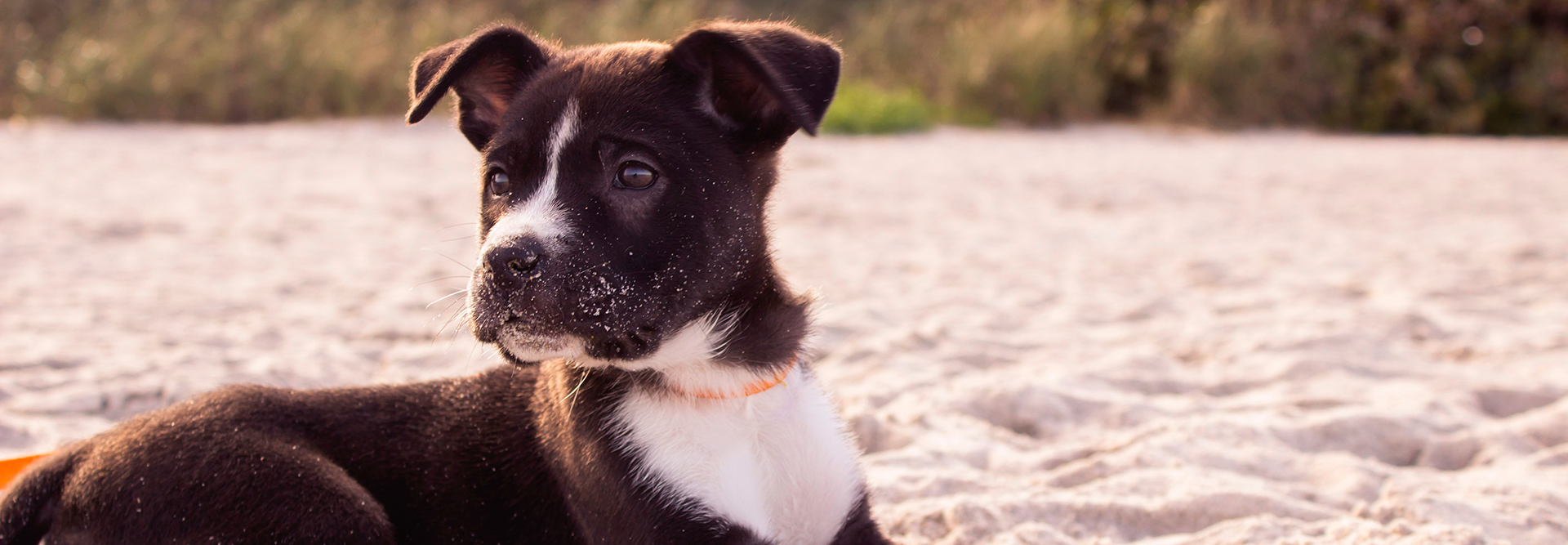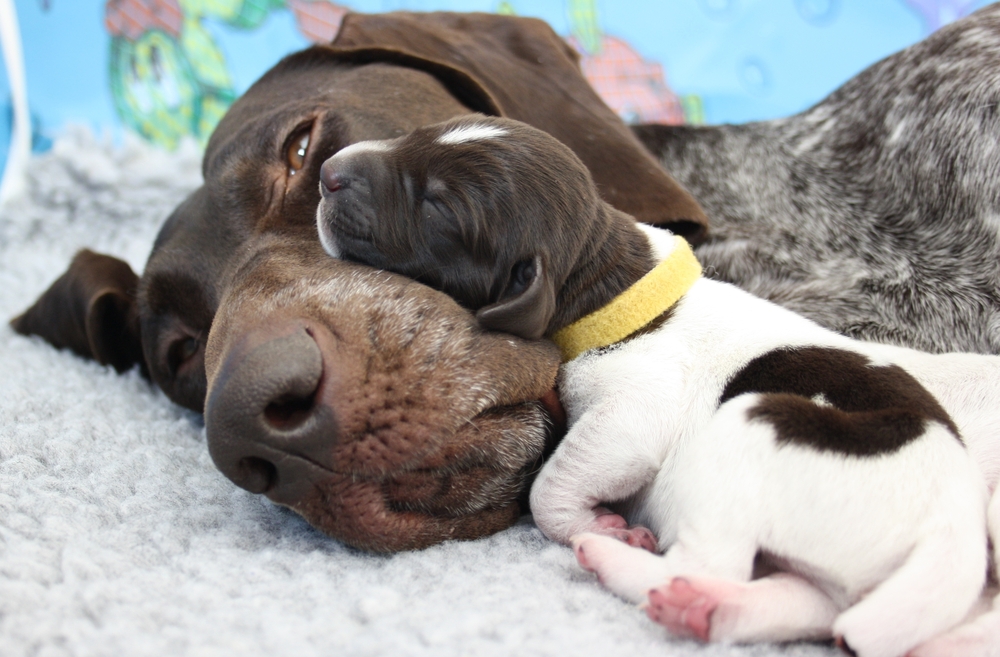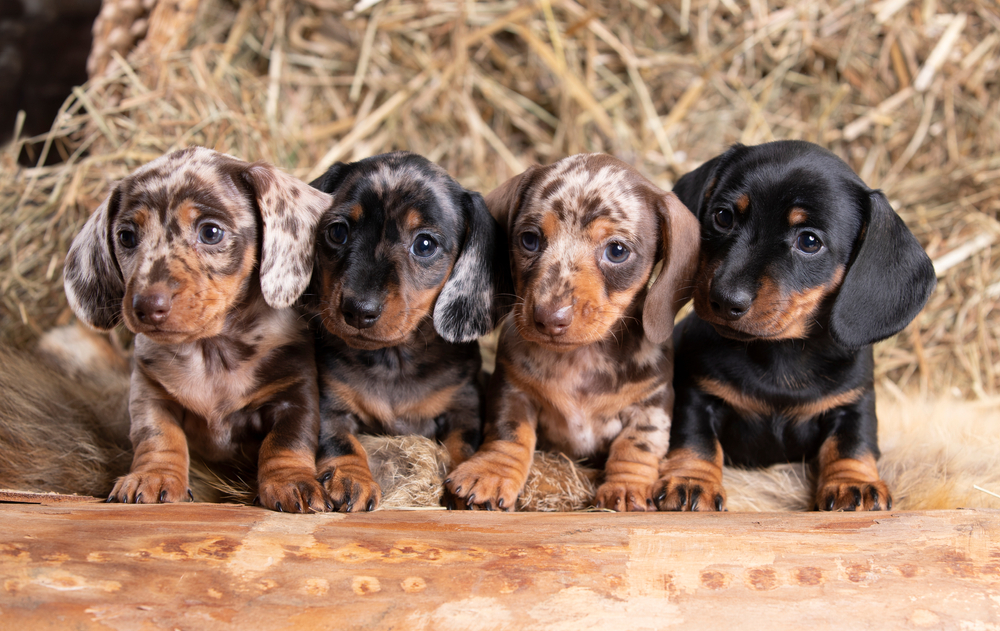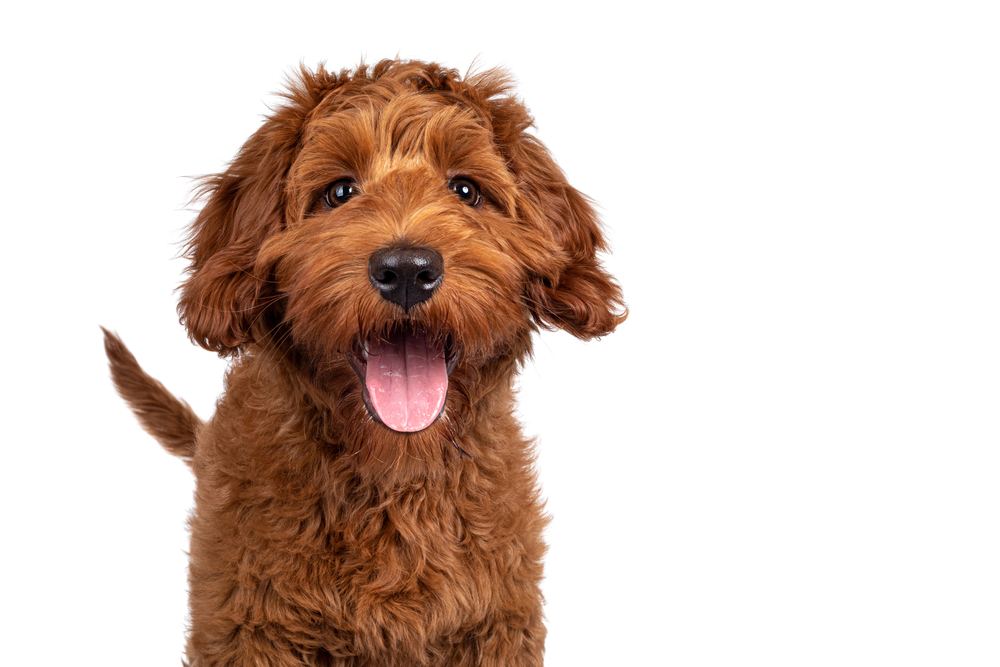Phone: +1 (903) 561-3142

Puppyhood is a joyful and mysterious time. Puppyhood generally lasts 8 months. For new puppy parents, this period of time can go by quickly. During their first 8 months of life, puppies develop physically, mentally, socially, and emotionally. Understanding puppyhood and the transitions that your puppy will go through can help you provide the best […]
Puppyhood is a joyful and mysterious time. Puppyhood generally lasts 8 months. For new puppy parents, this period of time can go by quickly. During their first 8 months of life, puppies develop physically, mentally, socially, and emotionally.
Understanding puppyhood and the transitions that your puppy will go through can help you provide the best love and care to make sure your puppy grows into a healthy adult dog. Here’s everything you need to know about puppyhood.

Newborn puppies are delicate and under the sole care of their mothers, regardless of whether the litter was born at a private dog breeder, commercial breeder, or hobby breeder. Newborn puppies have yet to develop all of their senses, such as eyesight and sense of smell. They sleep the majority of the time, snuggled next to their mother and siblings, and nurse when they’re awake.
From two to four weeks old, puppies develop quite a bit, still under the watchful care of their mothers. However, they will be handled when necessary by breeders and vets to make sure they’re healthy and developing. By four weeks old, puppies can walk, bark, and even wag their tails. At four weeks they will also get their milk teeth, and this starts a teething process that may or may not be painful.
From four to eight weeks old, a great deal of developmental changes occur for puppies. The most fundamental of the changes that these puppies experience are social and behavioral, but are kept within the confines of their litter. Their mother oversees their behavior and “teaches” them through encouraging and discouraging nudges. This is very light behavioral training that’s central to canines.
In addition to learning from their mothers, puppies also learn how to play and interact with one another. This is a playful time where puppies will test their own strength and boundaries. During this time, the breeders will also make a point to handle the puppies so that they grow comfortable with people picking them up, touching them, and playing with them.
Puppies will also experience new environments, textures, and stimuli during this time. This is intentional on the part of the breeders. Exposing puppies to a variety of settings helps their development, but these settings are nothing wild or crazy. Instead, the puppies will be introduced to outdoor play areas, grass and other surfaces, toys and games, and even more people. This is all to help prepare the puppies for going to their new homes, which typically occurs once they’re eight weeks old.

Until a puppy is at least eight weeks old, he will stay with his mother and siblings. This is crucial for his health and development. During this time, which we’ve already covered, the puppy will nurse from his mother and then transition to puppy food. He will also receive all the necessary vaccinations to keep him safe when he transitions to his forever home. For some puppies, this means a transition to a pet store first or other intermediary home.
At eight weeks of age, puppies actually develop “healthy fear” and other apprehensions. This is a normal stage of development, and even if the puppy stays with his mother, he will experience this stage. It may seem counterintuitive to transfer him to his forever home during the fearful stage. But this is actually a good thing. It’s best for the puppy to receive love, comfort, and encouragement from his forever pet parents throughout the fearful stage. This contributes to the bonding that will last a lifetime.
During eight to twelve weeks, your puppy will absorb everything like a sponge. He will be eager and attentive to learn, which means that applying as much time as possible to puppy training will go a long way. That being said, much tender, loving care should be used while socializing your puppy since he could be “fearful” about new experiences.
If you’re unfamiliar with the term “socialization,” socialization refers to any experience your puppy has meeting new people and animals, and having new experiences that develop his social skills.
An important aspect of socialization is your role as a puppy parent to provide positive, rewarding feedback when your puppy behaves well, versus your providing a negative consequence if your puppy disobeys you and behaves badly.
Appropriate negative consequences can simply be discontinuing the experience. For example, if your puppy has learned not to jump up during your training with him, i.e. he knows the command “down,” and yet continues to jump up on a new person that he just met even though you’re telling him “down,” then you can send him the message that disobeying you will get him nowhere by removing him from interacting with the new person and not giving him a treat.
There’s so much more to socialization than we can cover in this section. If you’d like to learn more, check out our article, Socializing Your New Puppy.
This period, from twelve to twenty-four weeks, is considered “pre-adolescence” in puppies. During this period of puppyhood, your puppy will shift from tending to be fearful about new people, places, and things, and grow genuinely curious about the unknown. His independent side will develop, and your puppy may enjoy exploring everything there is to explore.
This is also a great time to introduce your puppy to new levels of responsibility, such as complex, task-oriented commands. Spending extra time to train him in this fashion will help him control and channel prominent personality traits that are starting to emerge. Personality traits regarding your puppy’s dominance or submission will come out at this time, too. For this reason, now would be a good time to enroll him in a professional puppy training course like the one offered by Petland Texas, 6-Week Free Puppy Training.
Ideal puppy training courses are those where the professional dog trainer trains you on how to train your puppy. You and your puppy will attend the classes with other puppies and pet parents, which is a great socialization layer to add to your puppy’s experiences, too!
During pre-adolescence, your puppy will also go through another round of teething, as his milk teeth fall out and his permanent teeth come in. There’s a lot you can do to alleviate the pain and subsequent destruction that your puppy may cause to your home and personal belongings in his quest to curb his itchy, sore gums. We recommend teething chew toys that are designed to be kept in the freezer. These do wonders for numbing the puppy’s gums and quelling the pain.
Other than that, you’ll want to continue socializing your puppy as much as possible from twelve to twenty-four weeks. Since he’ll receive his final vaccinations during this time, you can bring him to the dog park and other parks for new experiences, too.

Ah, the rebellious “teenage” phase of…Welcome to six to twelve months of puppyhood. During this time, your well-trained puppy will start to test boundaries to see if he can inch any higher in the pack hierarchy. It’s important that you remain very firm if and when your adolescent puppy pushes a boundary. If you have other pets in the house, such as older dogs or cats, you’ll have to keep an eye on your pushy puppy to make sure that he doesn’t throw off the peace in the household.
Puppies at this stage of puppyhood development need a lot more attention, mental stimulation, and rigorous exercise. Some aspects of their new headstrong nature will be due to their hormones and sexual development. If you haven’t gotten your puppy neutered or spayed, now is the time to schedule the appointment!
Your puppy will become a bold explorer at this time, especially during outings where you let him off his leash. Again, we advise that you remain firm with maintaining the “rules” you’ve taught your puppy thus far. For example, if your adolescent puppy runs off and you call him back but he doesn’t return, then you might need to impose the heavy consequence of taking him home. He needs to learn that if he goes against you, all the fun will stop.
So long as you maintain healthy boundaries and remain unmoving in the house rules that your puppy has learned, the months of adolescence will be an enjoyable time for both of you! Be sure to savor every moment, because puppyhood will be officially over when your dog is one year old.
Are you in Texas and ready for a new puppy? Consider coming to one of our Petland Texas locations to meet our purebred puppies for sale. We work with trustworthy dog breeders and all of our puppies are American Kennel Club approved. To learn more about our puppies and ethics, visit the About Us page of our website.